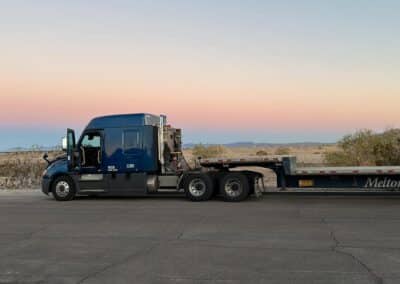Layover vs Detention Pay in Trucking
When it comes to truck driving, time spent on the road is money. Most drivers are paid by the mile versus hourly, which means if you’re not driving, you’re not making money. Delays are often unpredictable – traffic, weather, supply chain issues, shipper delays, etc. are all uncontrollable causes. To soften the blow that comes from losing that potential income, most companies offer layover pay and detention pay for drivers who aren’t moving. What’s the difference between the two, and how do you take advantage of this safety net? Let’s find out!
What is Layover Pay in Trucking?
Layover pay is the pay a truck driver receives while they’re waiting on a new load assignment. For example, if you deliver a load on Friday, it might take until Monday to find a new load to haul. Freight demands fluctuate throughout the year, so drivers will find themselves waiting for a new load at least a few times in their career. But how does a layover work?
The standard for layover pay is between $20-$80 per day, depending on the company. The clock for layover pay usually starts once a driver has been waiting for at least 24 hours and will continue to pay out for every subsequent day a driver isn’t moving. The layover fee at Melton pays $75 for the first 24 hours a driver is without a load, and then $75 for each 24 period after that.
What is Detention Pay in Trucking?
Detention pay for truckers is the pay a truck driver receives while they wait on a customer to load/unload their truck for an extended amount of time. For example, if your scheduled arrival time to a shipper/consignee was 8 AM and it takes them until 1 PM to get to you, the time you spent waiting is detention time. Depending on the customer, this may or may not be a frequent issue. However, if the driver is at fault for the time spent waiting, they might not qualify for detention pay.
The amount of detention pay a trucker will earn varies depending on the company and the time spent waiting. The standard for most companies to start qualifying for detention pay is 2 hours.
While layover pay is mostly out of a driver’s hands, being detained can be either the shipper/consignee or the driver’s fault. Detention in trucking can occur during the loading or unloading process that a driver can’t control, such as the customer running behind schedule or not having the proper equipment available for the job. However, if a driver arrives too early or late, they could be stuck waiting around until the shipper/consignee is ready for them.
How Do You Avoid Detention?
Fortunately, avoiding detention from the driver’s end can be simple! If it looks like you’ll be early to a delivery, be sure to call ahead and see if the shipper/cosignee has the capacity to load/unload early. The same thing applies when you’re on track to arrive after your stated time: communicate with the customer! Ideally, you’ll want to avoid being early or late by mapping out routes in advance, including scheduled break time. When calculating your route timing, make sure to allow 15-20 minutes of leeway to account for any unexpected delays!
What to Do When You’re Delayed?
Even after your meticulous planning, it happens – you’re stuck, either without a load or at a particularly slow shipper/consignee. You’ve done the appropriate filing for layover or detention pay with your company, but what now? Depending on the situation, this could mean a lot of free time on your hands. Here’s a few ideas to keep busy while waiting for work!
1. Exercise: There are plenty of trucker-friendly workouts you can do with little to no equipment! If you’re itching to get moving after a long drive, this could be a great way to spend some time.
2. Clean Out Your Truck: Been letting trash pile up in your cab? Now’s a great time to find a trash can and some cleaning supplies and make your truck look good as new.
3. Visit Nearby Attractions: This could be a stretch depending on where you find yourself being delayed. However, if you have the means, check out some local attractions or restaurants and make the most of your extra free time!
4. Give Your Loved Ones a Call: If you’ve been waiting for the right time to catch up with friends and family, now’s that time! Check in with your loved ones through a voice or video call and let them know that you’re thinking about them.
Now that we’ve defined layover pay and detention pay, it’s time to make the most of your down time. It’s hard to guarantee that you’re loaded 100% of the time, but companies like Melton know that your time is valuable and will compensate you for it. If you’re interested in learning more about how Melton pays our drivers, you can visit our page about truck driver pay rates. You can also check out some other blog posts below.





